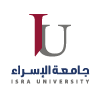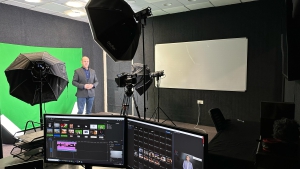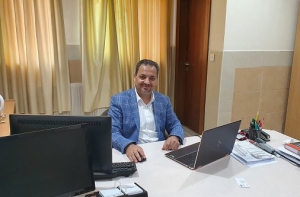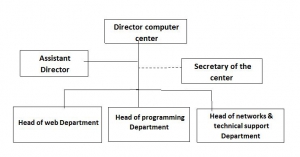| Isra University: Amman -Jordan Telephone :- 4711710-4711830-4711581
|
|||||||||||||
دائرة القبول و التسجيل
Admission and Registration Department
The E-Learning Center, inaugurated in 2012, marks a significant milestone in Al-Isra University's strategic plan for educational advancement. This establishment follows a systematic approach designed to enhance the learning and teaching processes in response to the demands of the modern technological era in the twenty-first century. Al-Isra University, recognizing the imperative of the digital age, embarked on the journey of redefining its pedagogical framework by embracing e-learning.
The university places a paramount focus on fostering a dynamic e-learning environment among both students and faculty. This commitment is integral to its educational agenda, emphasizing the cultivation of responsibility, effective communication skills, creative and critical thinking, and collaborative abilities. The aim is to facilitate a seamless transition toward a distinguished interactive educational ecosystem that culminates in optimal learning outcomes.
The E-Learning Center is equipped with state-of-the-art educational systems, including an e-learning management system, a synchronous virtual classroom system, and an interactive content building system. The center houses specialized departments to streamline its operations:
1. E-Learning Systems Department:
This department oversees the management of the infrastructure for e-learning operations. It is dedicated to providing and supporting technical systems and platforms. Furthermore, the department offers comprehensive training and technical support to both faculty members and students, ensuring the effective and proficient utilization of technology to enhance digital learning experiences across the university.
2. Digital Courses Development Department:
This department focuses on creating a professional production environment for the development of impactful, high-quality educational content. Equipped with cutting-edge technologies and specialized programs, the dedicated studio within the department facilitates the direct recording and editing of faculty lectures. Rigorous review and editing processes are employed to uphold the quality and efficacy of the content. Subsequently, these lectures are uploaded to the university LMS, enabling students to access them easily and at their convenience. This holistic approach underscores the seamless integration of technology into the teaching process, elevating the overall learning experience and ensuring effective access to educational content."
Since its establishment in 1991, the Department of Architectural Engineering has been striving to achieve both the vision of the University and the College which aimed at achieving academic leadership locally and internationally and the mission to provide the local and international community with a distinguished and competent graduate in the field of architecture engineering which would contribute in developing the country.
The department offers a bachelor's degree in architecture Engineering as it adopts in applying its academic program, well-structured study plans in the fields of knowledge that conform to the standards of accreditation in order to obtain national and international quality certificates.
The study of architecture is to cope with the modern and contemporary theories and transformations in architecture based on the rich Arab cultural heritage, taking into consideration local references as sources of inspiration as well as international standards.
The department also urges its students to learn computerized drawing and design programs as well as to use them in enrichment and development their design.
The department is interested in developing the professional ability of the student to produce various designs through their belief in the need to emphasize the integrative nature of architectural design and to identify the strategic needs of architecture (cultural, social and aesthetic) dimensions based on the principles of sustainability, as well as technical, administrative and legal awareness. Department of architecture engineering at Isra University also aims to strengthen the various drawing skills of students to provide the society with professional graduates having good design, construction and project management potentials.
The message:
The departments seeks to prepare the competencies architects who professionally and ethically qualified to serve and build the community through both the implementation of distinct educational curricula and the use of advanced educational techniques and emphasize the principles of sustainable development, with the presence of highly qualified teaching staff characterized by creativity , mastery , scientific honesty and continuous development.
Department Objectives:
- To generate skilled professional architects committed to advance the field and practice; trained in analytical and critical thinking skills
- Promote professional ethics, sense of responsibility and problem solving in the built environment.
- Enable graduates to become lifelong learners and to take a leading role in the professional practice both in Jordan and the region.
- Prepare Engineers interested with construction and engineering systems and keep pace with contemporary architectural movement
Program Outcomes:
1- An ability to identify, formulate, and solve complex engineering problems by applying principles of engineering, science, and mathematics.
2- An ability to apply engineering design to produce solutions that meet specified needs with consideration of public health, safety, and welfare, as well as global, cultural, social, environmental, and economic factors.
3- An ability to communicate effectively with a range of audiences.
4- An ability to recognize ethical and professional responsibilities in engineering situations and make informed judgments, which must consider the impact of engineering solutions in global, economic, environmental, and societal contexts.
5- An ability to function effectively on a team whose members together provide leadership, create a collaborative and inclusive environment, establish goals, plan tasks, and meet objectives.
6- An ability to develop and conduct appropriate experimentation, analyze and interpret data, and use engineering judgment to draw conclusions.
7- An ability to acquire and apply new knowledge as needed, using appropriate learning strategies.
In light of the profound technological developments witnessed by the world in recent decades, e-learning has emerged as one of the most critical means of advancing education in modern society. Representing a qualitative shift in educational content delivery, e-learning harnesses modern technology to empower students in accessing knowledge effectively and flexibly.
The significance of e-learning signifies a fundamental change in the approach to the educational process, affording students broader opportunities to allocate their time and space for learning. In this context, the role of e-learning becomes apparent in enhancing interaction and communication between students and teachers on a global scale. E-learning transcends geographical boundaries, offering learning opportunities to individuals worldwide, thereby fostering cultural exchange and enriching the overall learning experience.
Al-Isra University’s pioneering vision underscores its unwavering commitment to elevating the quality of education and fostering a modern and innovative educational environment through continuous improvement and development.
The establishment of a dedicated e-learning center is a testament to this commitment, aiming to enhance the performance of the teaching staff and maximize benefits for students. This center serves as a pivotal axis in the university’s strategy for developing and enhancing learning technology.
Faculty members are provided with opportunities to access specialized training and workshops that augment their skills in designing electronic content and utilizing the latest educational technologies. Additionally, the center strives to encourage interaction and the exchange of experiences among faculty members, fostering innovation and enhancing the overall quality of teaching.
From the student perspective, the center endeavors to deliver an effective and sustainable learning experience, facilitating easy access to online educational content and utilizing modern interaction tools. Furthermore, students are actively encouraged to participate in educational processes, leveraging modern technologies to enhance their learning, develop their skills, and achieve optimal educational outcomes.
Director of The center
Mr. Khalil Ali Barhoum
| The distinguished computerized Systems the center offers : | |
|
1) E-Registration System. |
1) To Automate all university Systems.
2) To Provide technical Support for all faculties and departments.
3) To establish an infra-structural computer network to include all university buildings, faculties, and administration department.
4) To Continuously upgrade the university website.
5) To use the computer as a basic device in accomplishing various duties.





